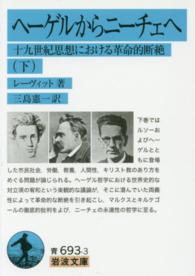- ホーム
- > 洋書
- > 英文書
- > Religion / Ethics
Full Description
After-Mission touches on on three questions.The first question is about self-perception and identity-formation strategies, and the various views that we have on the Protestants' relation to their Arab Muslim Middle Eastern context. This will furnish the basis for the ensuing parts, as it will provide the study with coherent and analytical readings of the cultural situation and intellectual views of the Arab Eastern Protestants in their Sitz im Leben from the perspective of the hermeneutic tripod of 'identity-othering-relationality'.
The second question, about the theological dimension, asks what kind of a theological discourse do the Protestants need to develop, and how do they need to re-form their own theological heritage, in such a manner that will allow them to heal the historical enmity and suspicion towards them from the Eastern Orthodox Christian community in the region? How should they re-think their traditional view on theological subjects common to them and the Eastern Christian tradition? Traditional Protestant attitudes towards Eastern Christianity, which have been viewed through the lens of evangelicalism and mission, have failed to grant the Protestants an influential and truly indigenous presence in the region and have led to them being constantly accused of being a foreign transplant and alien entity. In the light of this, it is clear that going beyond missiology and traditional evangelicalism demands re-thinking certain mutually shared but contentious theological subjects from a new perspective with the focus on more constructive attempts to build fellowship through dialogue.
Finally, the third question touches on the Protestants' future in the Arab Muslim Middle East by viewing this inquiry from a broader perspective that is related to all the Middle Eastern Christian communities' presence and role in the Muslim-majority context. It will discuss questions about the kind of presence and role that Christians, Protestants included, should hope to play in order to guarantee survival and a continuing presence in the region. The question of identity formation, and the managing of difference without trapping it in the mud of 'otherizing and self-otherizing', will also be tackled, so that the theological dimension is integrated with the broader, multifaceted contextual one.
Contents
Preface
Introduction
Part 1: Mission, Evangelicalism and Injīliyya as 'Identity Formation'
1 'After Mission, Beyond Evangelicalism' in Context
1 Approaching Mission in this Study
2 'After Mission' as Context
3 'Beyond Evangelicalism' as Outcome
4 After Reactionary Survival, Beyond Pragmatic Denial
5 Where To Go from Here?
2 The So-Called 'Nominal Christians' in the Arab Orient
1 Introduction
2 The 'Nominal' Christians
3 From 'Proselytism' to 'Reform from Within'
4 The Project of Reforming the 'Nominal Christians'
5 Questionable Weltanschauung, Problematic Achievement
3 The Arab Eastern Protestants Critically Appraised in Their Homeland
1 Introduction
2 'Who Are We? What Do We Represent?' Protestants in Their Own Eyes
3 The Protestants in the Eyes of Easterners (1): a Colonial-Imperialist Instrument
4 Eastern Protestants Respond to the 'Colonial-Imperialist' Accusation
5 The Protestants in the Eyes of Easterners (2): Culturally Alienated and Contextually Estranged Entities
6 Eastern Protestants Respond to the 'Cultural Alienation' Accusation
7 Protestants in Syria and Lebanon: Asking the Same Question Again?
4 Where Do the Injīliyyūn Stand? What Needs To Be Remedied?
1 Introduction
2 Identity Formation and the Otherizing Practice
3 From Euangeliun to Injīliy
4 When 'Evangelical' Became a Cultural Ideology
5 Identity as 'Difference': between Distinction and Opposition
6 Revising Western 'Evangelicalism' and Its Relevance to Arab Eastern Protestantism
7 Detaching from History and the Trap of 'Amnesiac Identity'
8 Promising Potential Changes upon the Horizon?
9 Injīliyya as Identity Crisis: Final Remarks
Part 2: Witness as Theologization: toward a Theological Self-Perception
Introduction to Part 2
5 The Injīliyyūn and Their Relation to the Ecclesial Past: Tracing the Roots of a Worldview
1 A Church without Roots? Or, Autobiographical Anamnesis
2 Why This Detachment from History?
3 What Would the Stance of the Protestant Reformers Have Been?
4 Suspicion toward the Past: a Possible Change upon the Horizon?
5 Frameworking a Diagnosed Crisis: Concluding Remarks
6 Towards an Arab Eastern Protestant Neo-Patristic Synthesis: a Proposal
1 Introduction
2 Why Neo-Patristic Synthesis?
3 On the Core Discourse of Neo-Patristic Synthesis
4 Protestant Neo-Patristic Synthesis: an Example of Implication
5 The Two Theological Outcomes of a Protestant Neo-Patristic Synthesis
6 Concluding Remarks
Part 3: Presence as Symbiosis: towards a Future Relational Role
Introduction to Part 3
7 The Injīliyyūn's Presence and Role in the Land of Islam: Intellectual and Contextual Analysis
1 Introduction
2 Sketching the Reformation's First Encounter with Islam
3 Protestant Missionaries' Encounter with Islam in the Middle East
4 The Injīliyyūn, Arab Eastern Christians and Islam Today
5 What Makes Relational Presence with Muslims a Challenge?
8 Are the Injīliyyūn Truly Surviving in a Post-Christendom Context?
1 Introduction
2 Setting the Scene: on Post-Christendom
3 'Post-Christendom' and the Christians in Early Muslim Greater Syria
4 Post-Christendom and the Christians of Greater Syria Today
5 Conclusion
9 The Injīliyyūn's Presence: Is 'Minority' Status Truly Applicable to Them?
1 Introduction
2 The Present Scene and the 'Alliance of Minorities' Slogan
3 On the Meaning of 'Minority' and on Being a 'Minority' in the Middle East
4 Philosophical Reflections on 'Minoritization' as a Practice
5 Who Are the 'Minority' in the Context of Syria and Lebanon?
6 Concluding Remarks
Postscript
Bibliography
Index of Persons
Index of Subjects








